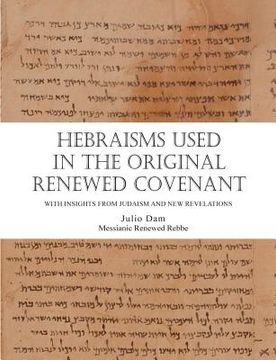Reseña del libro "Hebraisms in the Original Renewed Covenant (en Inglés)"
Was the Renewed Covenant was originally written in Aramaic, Greek, or Hebrew? First of all, let us say that the issue of the Renewed Covenant (New Testament) being written in Greek or Aramaic was non-existent prior to the Fourth or Fifth Century A.D. It has been a rather modern theory. Why is it important to ascertain in which language the Renewed Covenant (New Testament) was written? Because every language possesses an inner structure, a specific flavor, and idioms of its own, and brings with it a cultural background. All of these elements shape the way of thinking of its native speakers. In addition, a language's idioms are only fully comprehended in that language and in no other. To translate a language's idioms directly into another language only makes it absurd and reveals the foreign origin of it For instance. What does "taking my hair" mean in English? Nothing at all, since it is from an idiom in Spanish: "tomar el pelo." It is similar in meaning to the English idiom: "to pull one's leg." In order to translate it dynamically, one must first know that its origin is Spanish and to learn its meaning. Only then may one try to find an equivalent idiom in English, as we just did. On the other hand, what would happen if we assumed "taking my hair" was taken from French? We would be at a loss to find in French anything such as "prenez les cheveaux." We would conclude, erroneously, that the original came from a poor French translation, or some other mistaken assumption. This is exactly what happened with the Renewed Covenant language, as we shall try to prove. Our premise is that the Renewed Covenant's original language was neither Greek nor Aramaic, as popular wisdom goes, but Hebrew, the same Hebrew in which the Tanakh (Old/First Testament/Covenant) was written. It is only natural that it should be Hebrew, since we are dealing with the same country, only in a latter period of its history. Furthermore, Yeshua was living in Judea, surrounded by Jewish disciples, who had as their sacred text, a Tanakh written almost entirely in Hebrew. (Six chapters in Daniel are in Aramaic.) Is there any proof that the original language was Hebrew, and not Greek or Aramaic? Yes, there most definitely is. There are two kinds of proofs: internal and external. There are four kinds of internal proofs and five types of external proofs.. The question is: What external and internal proofs does the "Aramaic theory" have? The answer, quite un-believably is: Very few! There are a few, isolated, loaned words in Aramaic present in the Renewed Covenant, which are far outweighed by its Hebrew words. It is the same as if I would go about claiming that in Paraguay, the country in South America in which I live, English is the main language because we say "weekend," "sandwich," and "O.K."! "Aramaisms" were exaggerated and still are, as the noted Jewish lexicographer Moses Segal states, "Aramaic influence on the Mishnaic Hebrew vocabulary has been exaggerated. ... It has been the fashion among writers on the subject to brand as an Aramaism any infrequent Hebrew word. ... Most of the 'Aramaisms' are as native in Hebrew as they are in Aramaic" (Moses Segal, A Grammar of Mishnaic Hebrew, page 8). If one wishes to understand more precisely, and with any real depth, the language of Yeshua and His disciples, one should read His words either in the original language, or try to reconstruct it from the language one has at hand.

